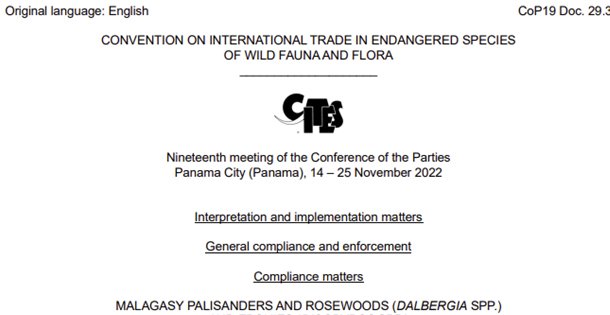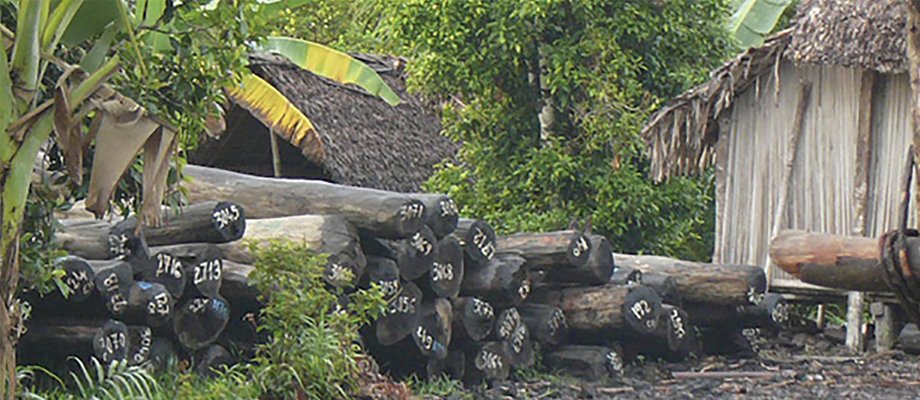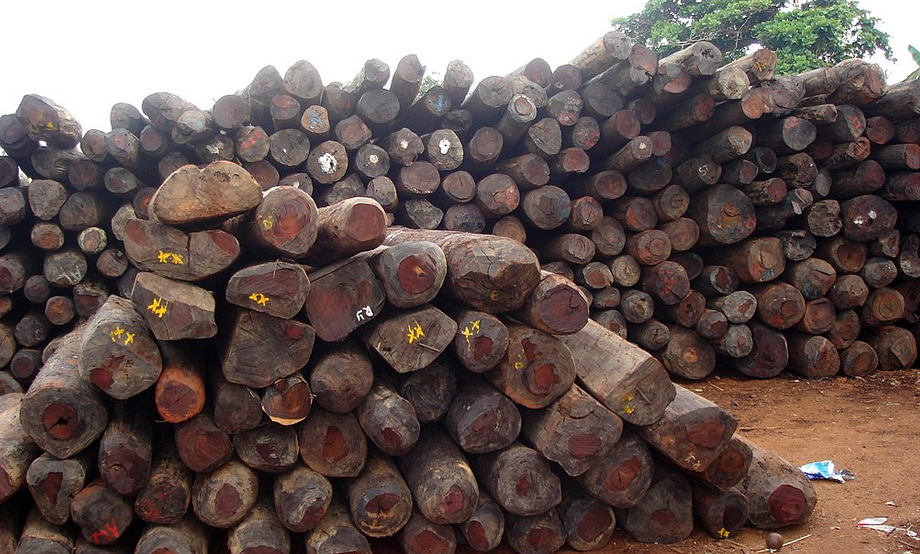THE CONSCIENTIOUS ENVIRONMENTALIST
we talk freely, informed, sciency, but always opinionated
The Survival of Madagascar’s Rosewood and Ebony at Stake!
by Mark W. Roberts, Derek Schuurman, Lucienne Wilmé, Patrick O. Waeber, 9 November 2022
Ahead of the 19th Conference of the Parties (CoP19) in Panama, the Secretariat of the Convention on International Trade in Endangered Species of Wild Fauna and Flora (CITES) released a draft decisions concerning Madagascar’s endemic species of rosewood and ebony.
The proposed decisions contain a provision allowing Madagascar to remove the “official stockpiles” from CITES jurisdiction before they have been audited and secured, by claiming that they will only be used domestically to restore governmental buildings and for artisans to make “handicrafts” weighing no more than 10 kg (22 pounds). The proposal contains no procedures to ensure that wood is used for the designated purposes or to prevent the wood from going into the illegal rosewood and ebony trade. Such a move would be disastrous. Read Wilmé et al. (2020) for an in-depth analysis on stockpiles and associated management risks.
The most obvious reason that removing the official stockpiles from CITES control would be disasterous, is that allowing such use of the unaudited and unsecured “official stockpiles” would create a ‘laundering machine’ where all the logs from other stockpiles and newly cut trees could be claimed to be from the official stockpiles and put into trade. Unfortunately, newly cut trees have a much higher value: some of the desirable qualities of timber logs deteriorate over time, as they are exposed to conditions such as drought, insects, etc., and as a result, any use of the stockpiles prior to full implementation of the CITES Action Plan, would endanger the remaining Malagasy rosewood and ebony trees.
The draft decisions recognizes that seized rosewood logs in Singapore, Kenya and Sri Lanka need heightened attention. It also continues the implementation of the Action Plan and it alludes to the need for a substantial budget for the plan’s implementation. Madagascar needs to be provided with the resources, expertise and financing necessary to finally fully implement the Action Plan—without these resources Madagascar has no incentive to implement the plan or audit and secure the hundreds of thousands of logs stockpiled throughout the country.
These decisions provide a basis for an in-session working group at CoP19 to review and revise these draft decisions so that they finally implement a program to protect Madagascar’s rosewoods and ebonies. Due to a general and pervasive malaise towards action in Madagascar due to ten years of realative inaction, the fate of Madagascar’s species of rosewood and ebony depend on decivive action at CoP19 to protect seized rosewood logs and prioritize effective, and properly resources implementation of the Action Plan. It is time for Parties and funders such as the World Bank and UNDP to step up and declare that they are going to take the steps necessary to protect Madagascar rosewood and ebony from the criminal syndicates that are currently trading these species with impunity.
For vital changes to be made to the draft, a call for action on Madagascar to protect its rosewood, ebony and its forests as a whole, is needed.
Here we are proposing certain changes to the draft decision. We are distributing a pdf version of the amended decision to all 180+ parties of CITES ahead of CoP19.
The amended draft decision on Malagasy palisander and rosewoods (Dalbergia spp.) and ebonies (Diospyros spp.)
Directed to Madagascar: 19.AA Madagascar shall:
a) audit and secure the stockpiles (including the undeclared and hidden stocks and stockspiles) of timber of Dalbergia and Diospyros spp. in Madagascar under the control of an independent entity in the business of maintaining secure facilities, as a priority, and submit monthly updates on audited inventories and independent oversight mechanisms, for consideration and further guidance from the Standing Committee; [see paragraph f) of Decision 18.96 as amended by the Standing Committee]
b) continue to identify the main commercially valuable species in the genera Dalbergia and Diospyros from Madagascar, in cooperation with the Secretariat and relevant partners, such as the International Tropical Timber Organization (ITTO), the Food and Agriculture Organization of the United Nations (FAO) and other intergovernmental and non-governmental organizations;
c) continue to make progress in the development of non-detriment findings for commercially valuable species in the genera Dalbergia and Diospyros, including implementation of appropriate monitoring mechanisms [note: an independent monitor could support the work on NDFs being undertaken by the Madagascar Scientific Authority];
d) for those species identified under paragraph b) establish, in collaboration with the CITES Secretariat, a precautionary export quota based upon a scientifically robust non-detriment finding;
e) continue the production of identification materials for timber and timber products from species of the genera Dalbergia and Diospyros from Madagascar [note: there is a need to create identification materials for customs around the world so they know if they are dealing with Madagascar rosewood and ebony; see e.g., Crameri et al. 2022, and the G3D-EU Project: “Sustainable management of Malagasy precious woods of Dalbergia and Diospyros, scientific support for the implementation of the CITES Action Plan” (July 2018–July 2023)];
f) for those species identified under paragraph b), strengthen control and enforcement measures against illegal logging and export at the national level, including strengthening laws and increasing capacity and training to undertake effective investigations, seizures, arrests, prosecutions, and sanctions, regardless of the title and level of responsibility of the offenders;
g) refrain from using any of the Dalbergia and Diospyros spp. logs in the official, undeclared or hidden stockpiles for any legal purpose until paragraphs a) through f) have been completed;
h) review the report and samples from Sri Lanka required in 19.CC concerning the Dalbergia logs offered for sale by Sri Lanka Customs, Central Disposal Directorate, in the Tender Sale that was to have taken place on July 4, 2022 and provide a report to the Secretariat clarifying whether Madagascar has reason to believe that the Dalbergia spp. logs in Sri Lanka were illegally exported from Madagascar;
i) provide reports on progress on the implementation of paragraphs a) through f) of this Decision to the Secretariat 60 days before the 77th and 78th meetings of the Standing Committee [note: these would take place in 2023 and 2024, respectively].
Directed to Singapore and Kenya: 19.BB Singapore and Kenya shall:
[note: see latest 360° synopsis by Mark Robertson on Mongabay]
a) as documented in the Notifications to the Parties No. 2019/051 and No. 2022/005 concerning shipments of illegal specimens of Dalbergia and Diospyros spp. from Madagascar to Singapore and Kenya respectively, all of the specimens of Dalbergia spp. and Diospyros spp. from Madagascar seized in 2014 in both Singapore and Kenya violated the CITES and Madagascar embargos and contravened Madagascar's obligations under CITES, and as a result, use all available mechanisms to confiscate the specimens of Dalbergia spp. and Diospyros spp. from Madagascar seized in 2014;
b) hold the specimens of Dalbergia and Diospyros spp. from Madagascar seized in 2014 until a disposal plan can be developed that is not detrimental to the survival of Madagascar Dalbergia spp. and Diospyros spp.;
Directed to Sri Lanka: 19.CC Sri Lanka shall:
a) report to the Secretariat and Madagascar within 60 days: 1) whether Sri Lanka is still in possession of the Dalbergia logs offered for sale by Sri Lanka Customs, Central Disposal Directorate, in the Tender Sale that was to have taken place on July 4, 2022; 2) if so, report the country of origin of the Dalbergia spp. logs and the date and details of the seizure of these Dalbergia spp. logs; c) if so, hold the specimens of Dalbergia spp. are held in a secure facility until further notification from the Secretariat;
Directed to the Plants Committee: 19.DD The Plants Committee shall:
a) develop a disposal plan for seizures of tree species and their parts that ensures that any disposal of the tree species and their parts is not detrimental to the survival of the species seized.
b) provide draft disposal plan to the Secretariat 60 days before the 77th meeting of the Standing Committee.
Directed to the Standing Committee: 19:EE The Standing Committee shall:
a) at its 77th and 78th meetings, the Standing Committee shall review reports from the Secretariat required under 19.GG(e) on the implementation of Decisions 19.AA and 19.BB, and take appropriate actions to provide Madagascar with the resources, expertise and resources to complete the actions required by Decision 19.AA.
Directed to the Parties: 19.FF The Parties shall:
a) as a priority, provide the resources, expertise, funding necessary for Madagascar to implement 19.AA paragraphs a) through f);
Directed to the Secretariat: 19.GG The Secretariat shall:
a) subject to external funding, assist with relevant capacity-building activities in Madagascar and transit and destination countries concerned by the trade in specimens of Dalbergia and Diospyros spp. from Madagascar; [see paragraph b) of Decision 18.99]
b) reissue a Notification to the Parties reminding potential destination countries of shipments of illegal specimens of Dalbergia and Diospyros spp. from Madagascar to take appropriate measures to ensure that such timber is not illegally transported or traded, including prohibiting entry, seizing such specimens upon arrival and apply appropriate sanctions against traffickers in accordance with the provisions of the Convention; and [see paragraph c) of Decision 18.99]
c) assist to Singapore and Kenya to ensure that the specimens of Malagasy Dalbergia and Diospyros spp. in their possession are confiscated and held in a secure facility until a disposal plan can be developed that is not detrimental to the survival of Malagasy Dalbergia spp. and Diospyros spp.;
d) evaluate the Report from Sri Lanka required in 19.CC and provide the Standing Committee with guidance on whether these logs were illegally exported and the measures that should be taken by the Parties with respect to these Dalbergia logs;
e) provide reports to the Standing Committee on the progress made on the implementation of this Decision and specifically Decision 19.AA directed to Madagascar, 60 days prior to its 77th and 78th meetings and as otherwise appropriate.
Committee to Protect Madagascar’s Rosewoods and Ebonies is a group of concerned scientists and conservationists who have been monitoring the situation since the end of the 2000s.
Mark W. Robers; contact: mark@ecopolicyadvisors.com
Derek Schuurman; contact: derekschuurman7@yahoo.co.uk
Lucienne Wilmé; contact: lucienne.wilme@wri.org
Patrick O. Waeber; contact: patrick.waeber@bfh.ch
The draft decision by CITES is available here.
Both images are stockpiles of illegally harvested Madagascar rosewood and ebony.
Picture 1; at the port of Rantabe, Madagascar, circa 2010. Image by Erik Patel via Wikimedia Commons (CC BY-SA 3.0).
Picture 2; probably at port of Tamatave; in the 2000s.Image source via Wikimedia Commons.
Banner image: Tropical forests in Vietnam. Open source by pixabay.



